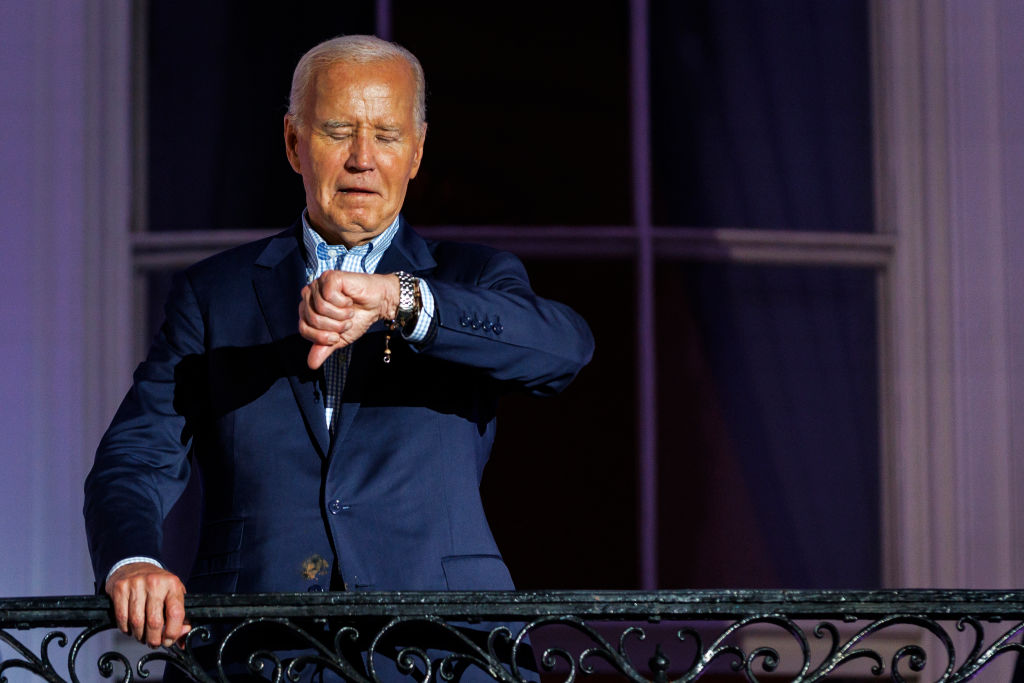Happy Monday! As much as we appreciated the time off last week, trying to cram four days of news into one morning newsletter was no easy task.
We hope you’ll forgive our verbosity today, there’s, er, a lot going on!
Quick Hits: Today’s Top Stories
- President Joe Biden sat down with ABC News’ George Stephanopoulos on Friday for a 22-minute interview—his first since the June 27 presidential debate—in which he defended his White House re-election bid and sought to reassure voters he is still capable of serving as commander-in-chief, saying his debate performance was merely a “bad episode.” “I don’t think anybody’s more qualified to be president or win this race than me,” Biden said. “I don’t think those critics know what they’re talking about.” The interview, however, failed to contain the growing panic within the Democratic Party about its presidential nominee. Billionaire Rick Caruso—a Democratic Party donor and runner-up in the 2022 Los Angeles mayoral elections—announced Saturday he would pause donations to the Biden campaign and urged Biden to step aside. Meanwhile, Democratic Rep. Angie Craig of Minnesota on Saturday became the fifth Democratic member of Congress to publicly call on Biden to suspend his reelection claim; at least six others reportedly made a similar case privately on a Sunday call with House Minority Leader Hakeem Jeffries. Senate Democrats were reportedly planning to hold a meeting to discuss the issue later today, but the huddle was canceled after news of its existence was made public.
- An alliance of leftist parties in France is projected to claim a surprise victory following the second round of French legislative elections over the weekend. Marine Le Pen’s far-right National Rally had a strong showing in the first round of voting last week and was expected to sweep the second round, but as of Monday morning, the left-wing New Popular Front was set to win 182 seats in the 577-seat National Assembly, with French President Emmanuel Macron’s centrist Ensemble party alliance—which performed dismally in the first round of voting—securing 163 seats and Le Pen’s right-wing National Rally winning 143. With no party or group of parties winning a clear majority in the lower house, it’s not yet clear how the eventual governing coalition will be formed—though Prime Minister Gabriel Attal offered Macron his resignation earlier this morning.
- In an election Friday precipitated by the death of President Ebrahim Raisi in May that millions of Iranians boycotted, Masoud Pezeshkian, a supposed moderate, defeated hardliner Saeed Jalil with 16.3 million votes to Jalil’s 13.5 million votes. A spokesperson for the U.S. State Department said that the elections “were not free or fair” and that the election would “not have a significant impact on our approach to Iran.” Ultimately, most of the power in Iran lies not with the president but with the country’s Supreme Leader, Ayatollah Ali Khamenei, who advised Pezeshkian to act “in continuation of the path” of Raisi.
- The United Kingdom’s Labour Party won a resounding 412 of 650 seats in parliamentary elections on Thursday, far exceeding the Conservative Party’s 121 seats. Keir Starmer, the head of the Labour Party, took over as prime minister from Rishi Sunak, a Conservative, on Friday morning, and named Rachel Reeves as chancellor of the exchequer—the British equivalent of a finance minister—making her the first female to ever hold the role. The new Labour government has promised to end a controversial Conservative migration policy that would deport migrants to Rwanda as well as create “GB Energy,” a state-run green energy investment firm.
- CIA Director William Burns is reportedly set to travel to Doha, Qatar, this week as Israel and Hamas seemed to make progress last week on a ceasefire deal. The negotiations are now reportedly focused on the timeline of the second phase of a three-phase agreement that would ultimately result in a permanent ceasefire in Gaza. Hamas—still holding more than 100 hostages—has repeatedly reneged on its public statements, but the terror group has reportedly dropped its requirement that Israel commit to the total ceasefire before the first stage of negotiations could begin.
- The New York Times reported Saturday that Caspar Grosse, a German medic in the Ukrainian army’s Chosen Company—a unit of skilled international soldiers fighting for Ukraine’s defense against Russia—alleged that he witnessed soldiers fighting for Ukraine kill wounded, unarmed, and surrendering Russian soldiers, actions constituted as war crimes by the Geneva Convention. The Times also reported that soldiers of the Chosen Company bragged about killing Russian prisoners of war in a text group message. Ryan O’Leary, a commander of the company and former U.S. Army National Guardsman from Iowa, denied his soldiers committed any war crimes, saying the text messages were “predominantly” about “blowing off steam.”
- The heads of three West African juntas in Mali, Burkina Faso, and Niger—which have been under military rule following coups in 2021, 2022, and 2023, respectively—formed an alliance on Saturday after meeting in Niger’s capital city of Niamey. “Together, we will consolidate the foundations of our true independence, a guarantee of true peace and sustainable development through the creation of the ‘Alliance of Sahel States’ Confederation,” Captain Ibrahim Traoré, Burkina Faso’s military ruler, tweeted on Saturday. In January, the three countries announced their departure from the Economic Community of West African States (ECOWAS)—a 48-year-old regional alliance of mostly democratic countries—though the nations’ memberships were previously suspended following military takeovers.
- Hungarian Prime Minister Viktor Orbán—whose country is a member of NATO and the European Union—met with Russian President Vladimir Putin in Moscow on Friday to discuss a potential peace deal with Ukraine, just days after meeting with Ukrainian President Volodymyr Zelensky in Kyiv. Orbán’s Hungary assumed the presidency of the EU last week, the beginning of a six-month term that rotates between member nations. No EU leader had met with Putin since he invaded Ukraine in February 2022, and Orbán—who has frequently obstructed support for Ukraine at the EU and NATO level—was sharply rebuked by EU officials, including EU Commission President Ursula Von Der Leyen. “Appeasement will not stop Putin,” she said on Friday.
- Judge Aileen Cannon, the U.S. federal judge overseeing former President Donald Trump’s classified documents case in Florida, rejected on Saturday a request by Walt Nauta—Trump’s personal aide and co-defendant in the case—to have the charges against him dismissed. Nauta’s lawyers had argued the charges represented vindictive prosecution by the government against him, a claim for which Cannon found there was “no evidence.” Also on Saturday, Cannon again delayed several deadlines in the case to allow prosecutors to respond to a request from the former president’s legal team to brief the court on the relevant implications of the Supreme Court’s ruling last week on presidential immunity.
- The Bureau of Labor Statistics (BLS) reported on Friday that the economy added 206,000 jobs on net in June, a hair above economists’ consensus projection of 200,000 jobs but down from the 218,000 jobs added in May. The government and healthcare sectors accounted for 119,000—or nearly 60 percent—of the new jobs for the month, and the unemployment rate ticked up 0.1 percentage points to 4.1 percent in June—the highest such rate since November 2021. Meanwhile, average hourly earnings—a measure taking the temperature of inflation—increased 0.3 percent month-over-month and 3.9 percent annually.
A MESSAGE FROM THE PROGRESS NETWORK
Tired of chaos and toxicity? Get some good news instead.
The negativity of today’s 24/7 news cycle is crushing. At The Progress Network, we decided to create something more balanced. Our weekly newsletter, What Could Go Right?, combines intelligent analysis with underreported stories of progress from around the world. It’s positive news you’ve never seen before: never fluffy, but always uplifting. Readers of The Dispatch can sign up for free!
Calls for a Biden Exit Approaching Critical Mass

Will he withdraw or won’t he? It’s the question that has dogged the political world every day since President Joe Biden’s disastrous debate performance late last month. Will inertia carry Biden through to the convention next month and a successful renomination, or is the status quo truly untenable, regardless of the president’s insistence on staying the course?
The drumbeat didn’t let up over the July 4 holiday, as the president hit the campaign trail and sat for an interview with ABC News and lawmakers kissed babies and walked in Independence Day Parades in their districts. Eleven days after the debate, with Biden’s limited efforts to restore confidence floundering and a steady stream of Democratic politicians and operatives calling for him to withdraw from the race, we could be inching toward “he will.”
For a growing number of lawmakers in Biden’s own party, the writing is on the wall—or rather, the poster—for the president. Five Democratic members of Congress have publicly called …
As a non-paying reader, you are receiving a truncated version of The Morning Dispatch. Our full 1,568-word story on growing calls for Joe Biden to step down is available in the members-only version of TMD.
U.K.’s Labour Regains Power After 14 Years On the Outs

On May 22, the United Kingdom’s then-prime minister, Rishi Sunak, took his place behind the podium on Downing Street to make an important announcement. The leader of the Conservative Party was asking the king to dissolve Parliament and calling a snap election.
Besides being an utter surprise, the announcement was also fairly inauspicious: For one thing, Sunak was standing umbrella-less in the pouring rain as he told Britons and the world of his decision to call an election. For another, protesters outside the gate were blaring Tony Blair’s New Labour anthem from the 1997 campaign when Labour won in a landslide. Plus, Sunak set the election for July 4—a day known the world over for ignominious British defeat.
As it turned out, the announcement foreshadowed the campaign and indeed the election results. Voters handed the Conservative Party its worst drubbing in its 200-year history, booting the party out of 10 Downing Street after 14 years in power. The Labour Party—led by new Prime Minister Keir Starmer—captured 411 out of 650 seats in the House of Commons. Still, behind the striking majority lies a less impressive vote share, suggesting the election may have been more about dissatisfaction with the Conservatives than wholesale enthusiasm for their left-wing opponents.
General elections for all 650 seats in the British lower house are required to be held once every five years, but British prime ministers can call a general election—for all 650 seats in Parliament—any time within five years of the previous election. In this case, Sunak could have picked a date as late as January 28, 2025.
Sunak did not take advantage of the time available to him, despite the fact that some two-thirds of the country disapproved of his party at the time he called the election. So why’d he do it? He may have been …
As a non-paying reader, you are receiving a truncated version of The Morning Dispatch. Our full 1,159-word story on last week’s British elections is available in the members-only version of TMD.
Worth Your Time
- David Axelrod, prominent Democratic operative and longtime adviser to President Barack Obama, doesn’t think President Joe Biden’s interview with ABC News on Friday assuaged fears about the president’s mental fitness. By conceding he was distracted and not “in control” during the debate, Biden gave credence to the main Republican attack on him, Axelrod wrote for CNN’s website. “The stakes are as great as Biden describes. And if he believes it, as I think he does, he will eventually do what duty and love of country requires, and step aside. If he does not, it will be Biden’s age, and not Trump’s moral and ethical void, that will dominate the rest of this most important campaign and sully the president’s historic legacy.”
- In his Notes from the Middle Ground Substack last week, Damon Linker published Part 2 of his conversation with Jonah about how to understand populism. “I said in my first reply that many of our political problems are American problems that manifest themselves differently on the left and right,” Jonah told Linker. “The surge in populism fits my thesis perfectly. I think historians will look at Occupy Wall Street and the Tea Parties as two sides of the same coin. Scholars have done a lot of work on the fact financial crises create populist upheavals that are more acute, broad, sudden, and long lasting than other economic drivers of populism like deindustrialization, outsourcing, etc.”
Presented Without Comment
Robert F. Kennedy Jr., on July 5, 2024: “My take on 9/11: It’s hard to tell what is a conspiracy theory and what isn’t. But conspiracy theories flourish when the government routinely lies to the public. As President I won’t take sides on 9/11 or any of the other debates.”
Also Presented Without Comment
Axios: How Biden’s Event Staffers Guide Him Behind the Scenes
For his events, President Biden’s staffers prepare a short document with large print and photos that include his precise path to a podium, according to an event template the White House sends to staffers.
… One template—a copy of which was obtained by Axios—is short and simple, with one large picture of the event space on each page, accompanied with big text such as: “View from podium,” and “View from audience.”
Also Also Presented Without Comment
Heritage Foundation President Kevin Roberts, on Steve Bannon’s War Room podcast:
We are in the process of the second American Revolution, which will remain bloodless if the left allows it to be.
In the Zeitgeist
In a U.S. vs. U.S. showdown on the grass at Wimbledon on Sunday, Emma Navarro, ranked 17th in the world, upset world No. 2 Coco Gauff in straight sets. But they still hugged it out at the end in what can only be described as a win-win for America.
Toeing the Company Line
- In perhaps our longest Dispatch Monthly Mailbag (🔒) yet, Steve answered your questions about everything from lessons learned in five years of The Dispatch, why he moved to Spain, and tolerance for unpleasant views—like those of Chicago sports fans. Members can click here to give it a read.
- In the newsletters: The Dispatch Politics crew checked in with No Labels in light of the Biden turmoil, Jonah explained (🔒) why Biden doesn’t deserve another presidential term, Nick unraveled (🔒) how Biden’s aides and top Democrats covered for Biden’s diminished capacity, Jonah weighed in on the Supreme Court’s presidential immunity decision in Trump v. United States, Chris examined how (🔒) Kamala Harris may fare against Donald Trump in a hypothetical general election, and Mustafa Akyol wrote in Dispatch Faith how the Enlightenment and religious values can work in tandem.
- On the podcasts: Steve and Jonah joined Sarah on The Dispatch Podcast roundtable to discuss Fourth of July traditions and Democrats’ political nightmare, Sarah and David dove back into the presidential immunity case on an extra long episode of Advisory Opinions, and Jonah ruminated on the Democratic Party and the Supreme Court’s presidential immunity decision. On today’s episode of The Dispatch Podcast, Jamie is joined by Maricopa County Recorder Stephen Richer to discuss what it was like being swept up in the tsunami of lies surrounding the 2020 election.
- On the site over the weekend: Cole dove into the mechanics of how Democrats could remove Biden from the ticket, Kevin explained why he thinks Kamala Harris ought to be the happiest person in the world, Dean Lockwood argued that the Boy Scouts of America hasn’t lost its itself amid recent reforms to include female members, TMD’s own Grayson Logue reviewed New York Times columnist Carlos Lozada’s latest book on political memoirs, and Guy Denton expressed his disappointment with A Quiet Place: Day One.
- On the site today: Charles Fain Lehman writes about the perils of marijuana legalization and normalization and Drucker profiles North Dakota Gov. Doug Burgum, reportedly one of three finalists to serve as Donald Trump’s running mate.











Please note that we at The Dispatch hold ourselves, our work, and our commenters to a higher standard than other places on the internet. We welcome comments that foster genuine debate or discussion—including comments critical of us or our work—but responses that include ad hominem attacks on fellow Dispatch members or are intended to stoke fear and anger may be moderated.
With your membership, you only have the ability to comment on The Morning Dispatch articles. Consider upgrading to join the conversation everywhere.